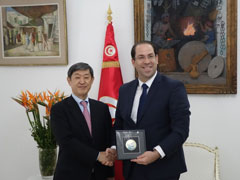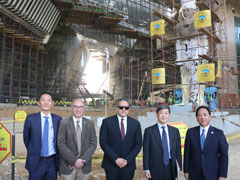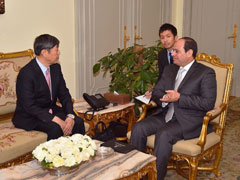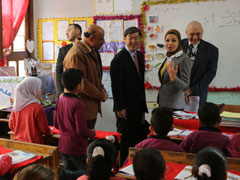JICA President Shinichi Kitaoka visited Tunisia, Egypt and India from Feb. 18 to 23. He met with government dignitaries, visited ODA project sites, and signed a Japanese ODA loan agreement with the government of Egypt for the "Egypt-Japan Education Partnership: Egypt-Japan School Support Program."
Tunisia, his first destination, is steadily transitioning to democracy after the 2011 revolution (the Arab Spring). The Tunisian National Dialogue Quartet received the Nobel Prize for Peace in 2015 for contributing to democracy in Tunisia. The quartet is made up of the Tunisian General Labour Union; the Tunisian Confederation of Industry, Trade and Handicrafts; the Tunisian Human Rights League; and the Tunisian Order of Lawyers. The Tunisian government needs comprehensive, sustainable economic growth to bolster the transition to democracy, so it is emphasizing better transportation infrastructure, the foundation of that growth.

Prime Minister Youssef Chahed, right, and JICA President Shinichi Kitaoka
On Feb. 18, in Radès, which is east of the capital of Tunis, Mr. Kitaoka visited the Radès-La Goulette Bridge, built with a Japanese ODA loan. He confirmed that it is working effectively as a key point on the Tunis metropolitan ring road that connects the greater Tunis area between north and south.
On Feb. 19, in Tunis, Mr. Kitaoka met with Prime Minister Youssef Chahed; Finance Minister Mohamed Ridha Chalghoum; Foreign Minister Khemaies Jhinaoui; and Development, Investment and International Cooperation Minister Zied Ladhari. Mr. Kitaoka said that because Tunisia is in a regionally strategic position, its stability and growth are important not only for the Middle East and Africa region, but also for the international community as a whole. He added that JICA will continue providing support in Tunisia on job creation, strengthening industrial competitiveness, correcting inter-regional disparities, and other issues. The dignitaries thanked JICA for its cooperation and said they hope for further development support.

JICA President Shinichi Kitaoka, second from right, at the site of construction of the Grand Egyptian Museum
Mr. Kitaoka visited Egypt next. Egypt has overcome two changes of government, in 2011 and 2013, and is strengthening its human resource development for sustainable growth while working to remake its domestic economy through economic reforms. These include liberalizing foreign exchange, reducing subsidies and restoring the tourism industry.
On Feb. 20, in Giza (west of the capital of Cairo), Mr. Kitaoka visited the museum being built through "The Grand Egyptian Museum Construction Project," a Japanese ODA loan project. He also went to the site of a technical cooperation project to improve that museum's preservation and restoration capacity. In addition, through talks with Minister of Antiquities Khaled El-Enany, Mr. Kitaoka confirmed the steady progress of the construction of the museum, which is expected to contribute to the restoration of Egypt's tourism industry.
The next day, Feb. 21, in Cairo, Mr. Kitaoka met with Egyptian President Abdel Fattah el-Sisi, Prime Minister Sherif Ismail, Minister of Investment and International Cooperation Sahar Nasr, Minister of Education and Technical Education Tarek Galal Shawky, Minister of Transport Hesham Arafat, and Minister of Health and Population Ahmed Emad El Din Rady. Mr. Kitaoka expressed his respect for the economic reforms Egypt is carrying out and for the leadership Egypt is showing in the stability and growth of the Middle East and Africa region. He went on to say that JICA would like to provide broad assistance on areas including Egypt's comprehensive, sustainable economic growth; poverty reduction; efforts to raise its standard of living; and human resource development. The dignitaries thanked JICA for its high-quality cooperation and said they hope for continued assistance.

Egyptian President Abdel Fattah el-Sisi, right, and JICA President Shinichi Kitaoka

JICA President Shinichi Kitaoka, center, visits an elementary school that adopted Japanese-style education
Mr. Kitaoka visited an elementary school where Japanese-style education is being introduced on a trial basis. An important example of Japanese-style education is “tokkatsu,” or special activities, which include students cleaning the school, a student being selected as class leader for a day, and class meetings. Mr. Kitaoka then signed a Japanese ODA loan agreement for the "Egypt-Japan Education Partnership: Egypt-Japan School Support Program" that supports the spread of Japanese-style education.
The last country Mr. Kitaoka visited was India. India and Japan have formed a "special strategic and global partnership."
On Feb. 23 in the capital, Delhi, in addition to speaking at a symposium as a special keynote speaker and having a dialogue with business people, Mr. Kitaoka met with Minister of Finance Arun Jaitley. Mr. Jaitley mentioned that JICA has been significantly contributing to India’s urban development through various projects including the Delhi Metro. He thanked JICA for its broad support, ranging from infrastructure improvement to social development, and said he hopes for continued support from JICA. Mr. Kitaoka and Mr. Jaitley also discussed a wide range of matters including the importance of steadily implementing ongoing Japanese ODA loan projects and making progress on the government of India’s Clean India initiative to improve the cleanliness and sanitation of the country.
JICA will continue to strengthen its relationships with Tunisia, Egypt and India.




scroll